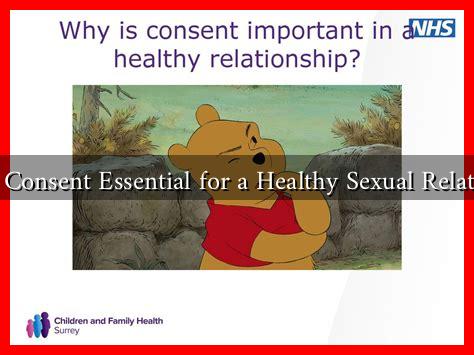-
Table of Contents
Why Is Consent Essential for a Healthy Sexual Relationship
In the realm of sexual relationships, consent is not just a legal requirement; it is a fundamental aspect that underpins mutual respect, trust, and emotional safety. Understanding the importance of consent can significantly enhance the quality of intimate relationships and foster a culture of respect and understanding. This article delves into why consent is essential for a healthy sexual relationship, supported by research, statistics, and real-life examples.
Understanding Consent
Consent refers to the agreement between participants to engage in sexual activity. It is an ongoing process that requires clear communication and mutual understanding. Consent must be:
- Informed: All parties should have a clear understanding of what they are consenting to.
- Freely Given: Consent should be given without any form of coercion or manipulation.
- Reversible: Anyone can change their mind at any time, even if they have previously consented.
- Enthusiastic: Consent should be expressed with eagerness and willingness.
- Specific: Consent for one activity does not imply consent for another.
The Psychological Impact of Consent
Consent plays a crucial role in establishing a healthy emotional connection between partners. When both individuals feel respected and valued, it fosters a sense of safety and trust. Research indicates that relationships built on mutual consent tend to have higher levels of satisfaction and intimacy. A study published in the Journal of Social and Personal Relationships found that couples who prioritize consent report greater relationship satisfaction and emotional well-being.
Statistics Highlighting the Importance of Consent
Statistics reveal the stark reality of sexual violence and the critical need for consent education:
- According to the Rape, Abuse & Incest National Network (RAINN), an American is sexually assaulted every 68 seconds.
- Approximately 1 in 5 women and 1 in 71 men will be raped at some point in their lives.
- Studies show that 63% of sexual assaults are committed by someone known to the victim, highlighting the importance of clear communication and consent in all relationships.
Real-Life Examples and Case Studies
Consider the case of a couple, Alex and Jamie, who have been dating for several months. They have openly discussed their boundaries and desires, ensuring that both feel comfortable and respected. One evening, they decide to take their relationship to a more intimate level. Before proceeding, they engage in a candid conversation about their feelings and boundaries, ensuring that both are on the same page. This open dialogue not only enhances their physical connection but also strengthens their emotional bond.
In contrast, a lack of consent can lead to devastating consequences. The #MeToo movement has shed light on numerous cases where individuals have experienced trauma due to sexual encounters that lacked clear consent. These stories emphasize the need for ongoing conversations about consent and the importance of creating a culture where individuals feel empowered to express their boundaries.
Building a Culture of Consent
To foster a culture of consent, it is essential to educate individuals from a young age about the importance of communication and respect in relationships. Here are some strategies to promote consent:
- Implement comprehensive sex education programs that include discussions about consent.
- Encourage open dialogues about boundaries and desires in relationships.
- Promote resources and workshops that focus on healthy relationships and consent.
Conclusion
Consent is not merely a checkbox in a sexual relationship; it is the foundation of mutual respect, trust, and emotional safety. By understanding and prioritizing consent, individuals can cultivate healthier, more fulfilling relationships. The statistics and real-life examples underscore the urgent need for ongoing education and dialogue about consent. As we move forward, let us strive to create a culture where consent is not just expected but celebrated, ensuring that every individual feels empowered to express their boundaries and desires.

